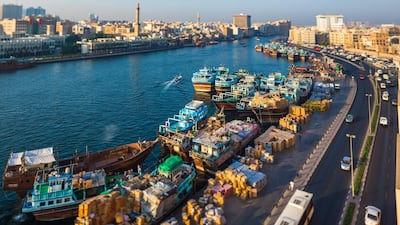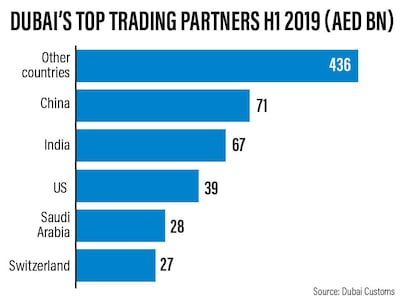Dubai recorded non-oil foreign trade of Dh676 billion in the first half of 2019, an increase of 5 per cent year-on-year from Dh644bn in the corresponding period last year, according to Dubai Customs data.
The first-half figures represent “staggering growth” of 87 per cent from 2009, the Dubai Government media office said in a statement Saturday.
“The strong performance of Dubai’s foreign trade reflects the robust fundamentals of our economy and our ability to generate fresh growth opportunities even in an adverse global environment,” said Sheikh Hamdan bin Mohammed, Crown Prince of Dubai. “Dubai’s ability to maintain high levels of trade growth is a tribute to the vision and planning of its leaders who sought to drive economic diversification at an early stage and create a hard and soft infrastructure that empowers growth.”
Exports increased by 17 per cent to reach Dh76bn, while re-exports were up 3 per cent at Dh210bn. Imports grew by 4 per cent to Dh390bn.
Dubai’s foreign trade out of free zones was the biggest contributor to the overall increase, accounting for Dh287bn, a 12 per cent increase year-on-year. Direct trade continued to be the largest contributor to the total at Dh386bn.
Non-oil foreign trade volumes surged 31 per cent to 56 million tonnes from 43 million tonnes in the first half of last year. Exports rose by 46 per cent to 10 million tonnes, re-exports were up 39 per cent to 9 million tonnes and imports increased 26 per cent to reach 38 million tonnes.
Dubai, and the UAE as a whole, have been undertaking a series of measures to boost the non-oil economy. Dubai Ruler Sheikh Mohammed bin Rashid unveiled a 50-year Charter for the development of the emirate in January. Among the initiatives is the "Dubai Silk Road" strategy to enhance international trade with "friendly neighbours" through improvement in trade and logistics services.
“The latest results also point to Dubai’s rapidly-growing trading links with the world’s fastest growing economies. As the Dubai Silk Road project begins to take shape, the outlook for the emirate’s foreign trade is set to get even better,” Sheikh Hamdan said.
China remained Dubai’s largest trading partner, contributing Dh71bn, a 4 per cent increase. However, India is quickly catching up with 20 per cent year-on-year growth to Dh67bn. The US was the third-biggest trading partner, contributing Dh39bn.
Saudi Arabia maintained its position as Dubai’s largest Arab trade partner and was its fourth-biggest partner globally, with Dh27.7bn. Switzerland came fifth at Dh26.5bn.
“With the continued upward trend of the foreign trade sector, we have reasons to be positive about the future of our national economy,” said Sultan bin Sulayem, chairman of Dubai's Ports, Customs and Free Zone Corporation, and DP World’s chief executive and chairman.
The trade of gold, jewellery and diamonds contributed Dh180bn. The second-highest traded commodity by value was mobile phones at Dh79bn. Trade in petroleum oils more than doubled to Dh48bn and cars accounted for Dh33bn.



